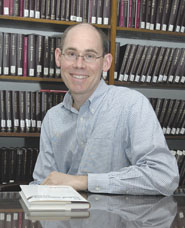  |
| HOME | THIS ISSUE | CALENDAR | GRANTS | BACK ISSUES | < BACK | NEXT > |
‘Myths’ about medical malpractice challenged by insurance law expertby Scott Brinckerhoff - November 28, 2005 |
||||
|
The subject of medical malpractice tort reform agitates the Bush Administration, insurance companies, trial lawyers, and UConn law professor Tom Baker, all for different reasons. The Administration says laws should be changed to make it harder to sue and collect large sums in medical malpractice cases. Those ideas also play well with insurers. Trial lawyers, on the other hand, oppose legislation that would limit large damage awards for clients and, by extension, substantial legal fees. In a new book published in October, Baker, the Connecticut Mutual Professor of Law and director of the law school’s Insurance Law Center, lays out the competing positions of various participants in the medical malpractice tort reform debate while unveiling his own primary conclusion, which some readers may find surprising: The problem is not too much litigation, but too much medical malpractice. Using data from a number of studies, including one that found nearly 100,000 Americans a year are injured or killed by malpractice, Baker shows that only a small percentage of people actually sue. “Depending on the study, there are between seven and 25 serious medical malpractice injuries for every medical malpractice lawsuit,” he says. “By comparison, almost everyone who gets injured by a negligent driver files a lawsuit or claim.” The book also examines malpractice insurance premiums paid by doctors; jury verdicts in malpractice cases; and the role of “defensive” medicine in driving up health care costs. Premiums fluctuate because of market forces, he says, rather than an explosion of litigation, as some observers maintain. Individual specialists such as obstetricians pay far more than doctors whose potential for injuring patients is considerably less. But Baker says annual premiums, which average about $12,000 per doctor, equate to less than one percent of U.S. health care expenditures. He contends these premiums do not contribute in any meaningful way to the cost of health care. “If policymakers think obstetricians have to pay too much, the answer is to change medical malpractice insurance, not tort law,” he says. Baker’s investigation shows that jury verdicts do not favor plaintiffs over defendants, and that cases with little or no merit rarely reach a jury, despite the Bush Administration’s position that “every claim filed by a personal injury lawyer brings the chance of a huge payoff or a profitable settlement out of court.” As for the charge that doctors practice defensive medicine, ordering unnecessary and costly tests and procedures, Baker says, “tort law, with its potential for punishing malpractice, encourages doctors and hospitals to err on the side of caution.” But he says studies suggest there is less excess testing than people might think, and that in any case, doctors often differ on what protocol is appropriate in any given case. “How do you know what’s an unnecessary test if you don’t know what a necessary one is?” he says.
Like much of Baker’s previous writing about the insurance industry, The Medical Malpractice Myth draws on history, psychology, and morality, and demonstrates that he is not reluctant to take a position that runs counter to what might be called common wisdom. For example, in one earlier paper based largely on interviews with attorneys, he concluded that both lawyers and plaintiffs rarely try to extract “blood money” – or personal funds – from defendants in personal injury cases, so long as insurance money is available. The conclusion might raise the eyebrows of readers who believe plaintiffs’ lawyers are intent on achieving the largest possible damage award rather than merely an appropriate one. In another paper, Baker looked at the roots of insurance, one of the oldest professions. Using examples from Victorian England, he posits that insurers cared as much about the moral stature of their clients as they did about whether, say, a building being insured against fire was close to a source of water. Baker even draws on an episode in the novel Vanity Fair to illustrate how emotionally charged the subject of life insurance could be among the upper class of 19th-century England. One gentleman’s purchase of life insurance causes other characters to speculate endlessly about his motives, character, and personal situation. Amid actuaries and economists, the moral underpinning of insurance survives today, Baker says, in that companies favor the most stable individuals and populations. “One of the functions of insurance companies is to put people into risk groups, and that’s challenging,” he says, “because in other aspects of life, it sounds like discrimination and it involves stereotyping.” Before entering academia, Baker was a practicing attorney in Washington, D.C., where he also served as an associate counsel for the independent counsel investigating the Iran-Contra case. He has served as a visiting lecturer at Yale Law School, a visiting professor at the Hebrew University of Jerusalem, and an associate professor at the University of Miami School of Law. Insurance law had interested him ever since law school at Harvard, so he was quick to accept the offer from UConn to set up the Insurance Law Center. And, he adds, there was an added benefit. Since it was located in Hartford, “I didn’t have to explain insurance to everyone.” A panel on “The Future of Medical Liability Reform” will take place on Tuesday, Dec. 6, from 4 to 6 p.m. at the Law School. Panelists are Matthew Dolan, president of OneBeacon Professional Partners; Michael Koskoff, partner, Koskoff, Koskoff, and Bieder; and Michael McCann, the Gordon Hirabayashi Professor for the Advancement of Citizenship at the University of Washington; with moderator Adam Scales, visiting professor of law at Washington & Lee University’s School of Law. RSVP to 860-570-5184. |
| ADVANCE HOME UCONN HOME |

